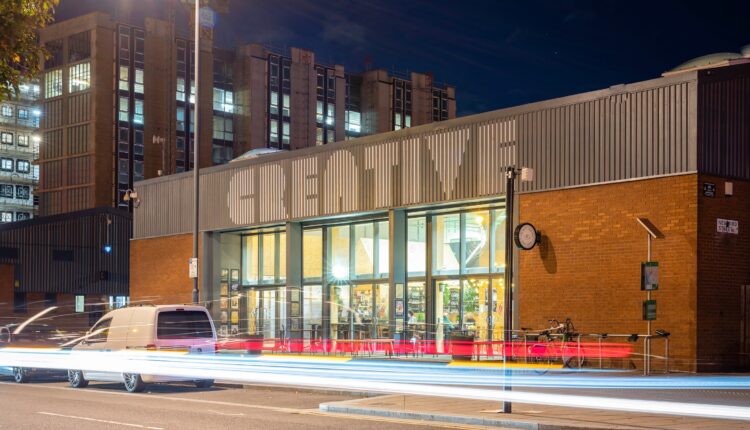Creative & digital sector will ‘bounce back’, insists Baltic boss
Baltic Creative CIC managing director Mark Lawler says its facilities in Liverpool’s Baltic Triangle will see a ‘soft reopening’ in June and said its tenants had shown remarkable resilience. Tony McDonough reports

Liverpool’s digital and creative sector will “bounce back” from the coronavirus crisis and continue its phenomenal growth, the boss of the city’s Baltic Creative hub has told LBN.
Announcing a “soft reopening” of Baltic Creative CIC’s two facilities on June 8, managing director Mark Lawler delivered an upbeat message, saying its tenants had shown remarkable resilience since the lockdown was imposed on March 23.
He added that a number had moved quickly to adapt their business models to suit the fast-changing times. It was this willingness to change and innovate, he said, that would help the sector recover from the economic shock.
Based in the city’s Baltic Triangle district, just south of the city centre, the Baltic Creative facilities have remained open for a handful of businesses who needed access to space and equipment so they could continue to trade.
And now, Mark wants to send a clear message that Baltic Creative is fully “open for business”, encouraging more of its tenants to come back to use the facilities. He said: “We are going to lift up the shutters and welcome people back.
“We are expecting a void level in the units of between 15% and 30% over the next few months. But we also know that 60% of our tenants are keen to come back and we already have enquiries from other businesses that are looking to take space.”
In just a decade, Baltic Creative CIC has led the incredible transformation of the Baltic area from a deserted wasteland of old docklands warehouses into the one of the fastest-growing creative and digital hubs in the UK. That, in turn, has led to a number of bars, restaurants and retail outlets to open up.
Baltic Creative CIC houses more than 180 creative and digital businesses, who employ more than 600 people. It currently manages more than 118,00 sq ft of workspace specifically designed for the creative and digital sector (106 workspaces, two venues, three cafes, five meeting rooms).
Baltic Creative’s annual GVA economic output into the Liverpool city region economy currently stands at £16.6m and, prior to the COVID-19 crisis, the creative and digital sector was growing two-and-a-half times faster than other business sectors in Merseyside.
Revealing a snapshot survey of the health of its tenants, Mark said the last few weeks had been “incredibly tough” for its businesses and acknowledged it would continue to be so for some time.
The survey, was carried out among 47 of Baltic Creative’s tenants from developments including Creative Campus, Northern Lights and Digital House. It revealed that almost 80% of the businesses have seen their incomes negatively impacted to some degree since the UK lockdown began.

Of that 80%, 20% have received no income at all since March 2020. However, by the end of April, 55% of Baltic Creative’s tenants had already diversified their product and service offerings in order to survive, with the majority of employees now successfully working from home.
“There’s no shying away from the fact that it is a remarkably difficult time and every single one of our tenants is facing their own unique set of circumstances,” added Mark. “For our hospitality occupiers, it is particularly tough, and we are working hard behind the scenes to try to provide support and guidance so that as many businesses as possible can make it through this period.
“But this period has also given people the opportunity to reflect on their businesses. Collaboration is the bedrock of what we do, here. Around 70% of businesses, here, collaborate with each other. They don’t do that because it is a nice thing to do, they do it because it is important to their businesses.”
Mark added that the CIC was mirroring the strategy of its tenants and was looking at how it can adapt to the post-lockdown world. He explained: “There will be some tenants who may actually need more space so they can comply with social distancing rules.
“Across the estate, businesses typically employ four or five people and it may be those people will be working from home more than they have before, even after lockdown. So those businesses may say ‘we don’t need space seven days a week, just one day a week to bring our team together,’.
“We are beginning to look at ways in which we can adapt the offer at Baltic Creative CIC and still make sure it is as affordable and accessible to as many businesses as possible.
More than 95% of our tenants have said that they feel that they are getting enough guidance and support from us so hopefully this will stand us all in good stead to weather the storm together.”
Late last year, Baltic Creative CIC unveiled plans to replicate its model in other parts of the city region. Mark says they are still keen for that to happen but added the strategic planning process had been temporarily paused.
He said: “We had two design teams working on two new areas in the city region. They are on hold at the moment, while we take stock. But there is no question that we are still ambitious to grow.”

